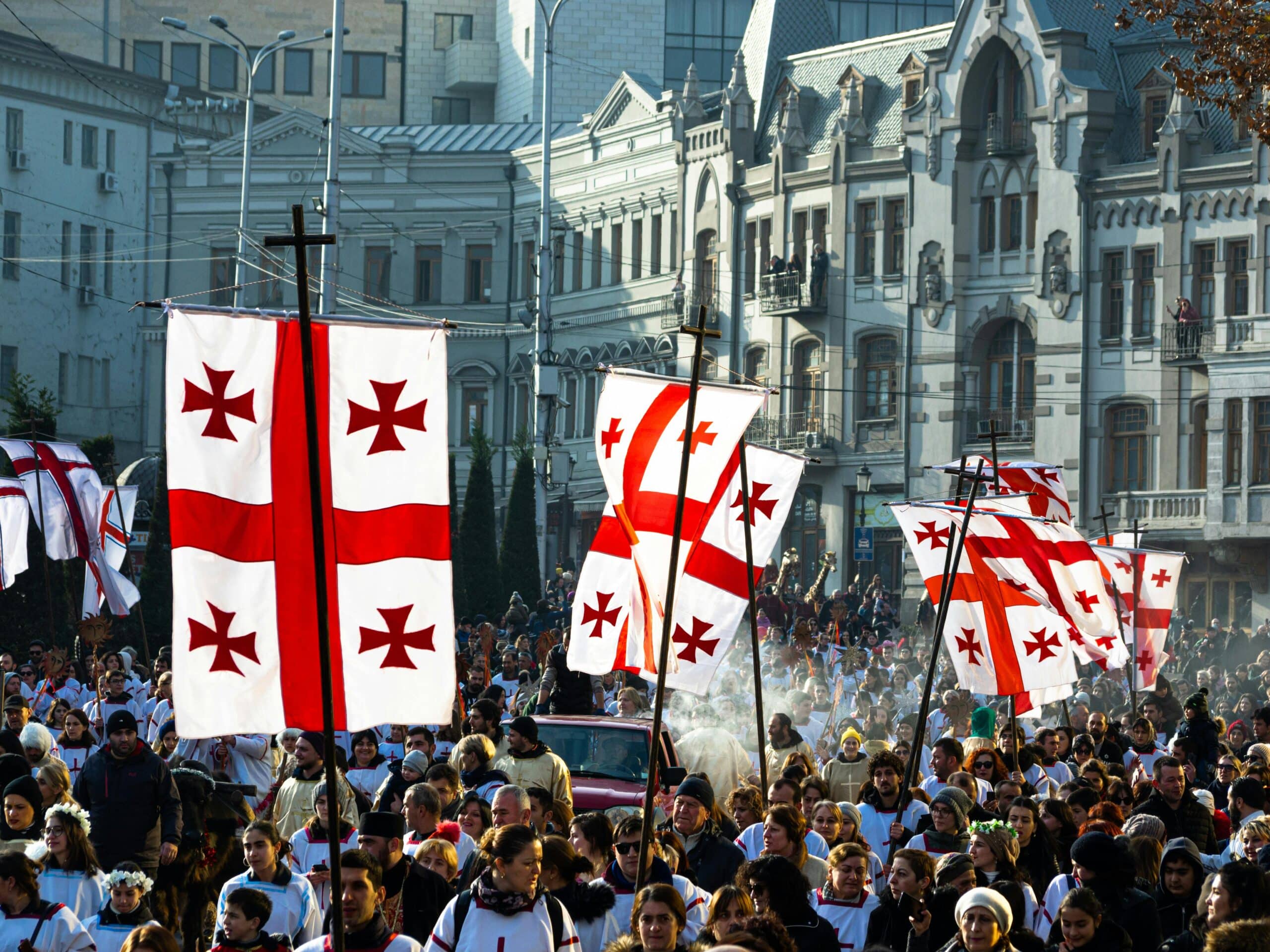Photo: Georgian flags flying in the capital Tbilisi. Source.
Thousands of protesters took to the streets in the Georgian capital Tbilisi in recent days to protest the reintroduction of a notorious ‘foreign agents’ law. It was proposed On April 3 by Georgia’s ruling party Georgian Dream (GD) and is a slightly amended version of a law that was proposed in March 2023 but subsequently withdrawn after international criticism and mass protests in the country. Georgian opposition, the European Union (EU) and civil rights groups have voiced their strong opposition to the law. It bears clear resemblance to a similar law in Russia that is used to silence anyone critical of the government. The reintroduction of the law comes after many other incidents that have put doubt on whether GD will lead Georgia to its much-anticipated accession to the EU.
The law
Officially, the new law is referred to as the ‘On Transparency of Foreign Influence’ bill. The only notable change compared to last year’s proposal is the replacement of the term ‘foreign agent’ with ‘organization pursuing the interests of a foreign power’. The purpose of the law, however, remains unchanged. It seeks to scrutinise individuals, media outlets and civils society groups that receive more than 20% of their funding from abroad. Noncompliance with financial reporting requirements, even if very minor, could lead to hefty fines and prison sentences of up to 5 years.
The term ‘foreign agent’ has been a favourite of the Russian government. Critics have drawn parallels between the law and a similar one enacted in Russia in 2012. It reminds many of the ‘enemy of the people’ label that was broadly used during Soviet times to discredit the opposition. The law is used as a tool by the Russian government to root out and exclude voices critical of the state. Where initially it only applied to NGO’s, the law was gradually expanded and now applies to any organisation or individual that is deemed critical of the government.
According to GD, NGOs are used by foreign actors as well as the main opposition party United National Movement (UNM) to selectively discredit the judiciary. It also accuses them of spreading LGBTI+ propaganda, ‘pseudo-liberal ideology’ and attacking the legitimacy of the Georgian Orthodox Church. Considering GD’s capture of the judiciary, which it already uses to persecute political opponents, opposition fears seem justified. The new law could solidify GD’s grip on political power and help them to further sideline political opposition.
EU accession
Amidst the geopolitical turbulence sparked by the Russian invasion of Ukraine and the accelerated accession procedure of Moldova and Ukraine, Georgia also applied for EU membership in 2022. It was handed twelve key priorities by the EU regarding political freedom, anti-corruption, de-oligarchisation and the protection of human rights and civil society. For Georgia to become a member, substantial progress in these areas needed to be made.
It came as somewhat of a surprise when the country was granted candidate member status in late 2023. It had only sufficiently acted on three of the twelve priorities while also having a limited alignment of security policies with the EU. Nevertheless, the EU’s decision was greeted with great enthusiasm in Georgia. Large crowds gathered on the streets to celebrate what was considered a historic moment for the country.
Surveys have shown that there is broad support for joining the EU among Georgia’s population with at least 75% in favour. Although it is clear that there is a strong desire to join, the reasons for wanting to do so seem diffuse. Some Georgians look to the EU for the protection of human rights, liberal values and a strong rule of law. Others consider the economic benefits and the security the EU offers as the primary reasons to join. One does not have to exclude the other, but the perception of what membership means is crucial for the efforts made to achieve it.
Strategic positioning Georgian Dream
GD has consistently voiced support for EU membership and has overseen real rapprochement with the European Union and NATO over the past decade. The 2016 EU association agreement and the establishment of a NATO base in the country were considered clear signs of the country moving towards the West, and away from Russia. The party therefore tries to take credit for Georgia being granted candidate status, even though it did little to comply with the conditions set by the EU.
Because GD is aware that being pro-EU is necessary to be successful in Georgian politics, it constantly proclaims support for the EU. It stands in stark contrast, however, with both the parties’ warm relations with Russia and its conservative identity politics. Some of its rhetoric is so suspiciously familiar to Russian talking points that it might as well be taken straight from Putin’s playbook. The recent proposal for an ‘anti-LGBTQ’ law shows the lack of commitment to the liberal values that are so crucial for joining the EU. With traditionalist rhetoric centred around ‘family values’ and antagonism towards the LGBTQ+ community, GD appears to cater to conservative voters in the leadup to the 2024 parliamentary elections.
While GD may be motivated by the economic benefits of EU membership, its policies and rhetoric increasingly contradict EU values. Thus, the EU’s decision to grant Georgia candidate status could be seen as risky, potentially legitimizing a party openly challenging EU principles. Although the EU could use a strategic ally in the Caucasus with a pro-EU population, it should remain watchful not to embolden the ambitions of the ruling party that could push the country away from the EU.



